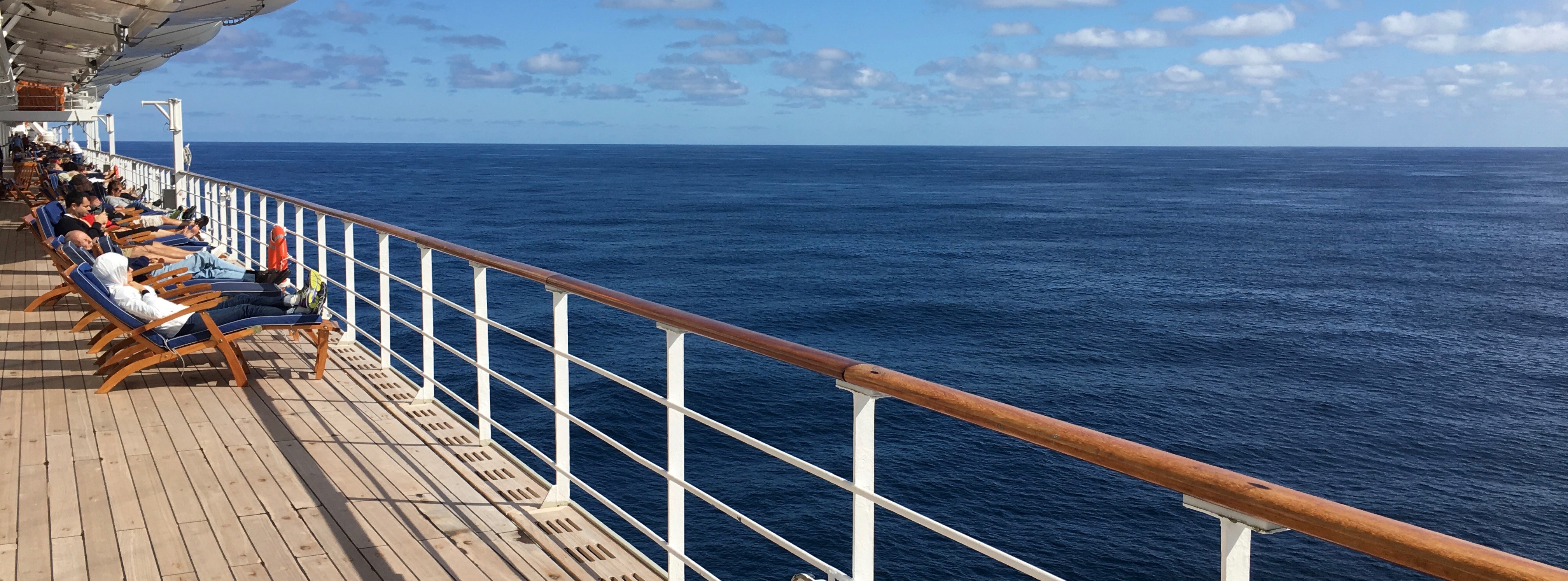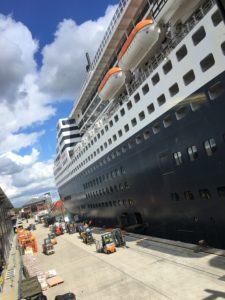
After taking the train from London with my NRI colleagues Lindsay Craig (along with her husband and daughter) and David French, we arrived into Southampton, England on August 30 and checked into our hotel there, where most of the other attendees of the National Review (NR) cruise were staying. In the late afternoon, a welcome reception began, where longtime NR publisher and now Vice President, Jack Fowler, welcomed everyone. In addition to all his other duties at NR, Jack organizes these cruises down to almost every detail.
During the welcome session in Southampton, I was standing in the back facing the stage when a gentleman walked in behind me, dressed very casually, with his three children. I introduced myself like I was doing to everyone else walking in. As soon as I did, I looked a little closer and realized I had just shaken hands with Daniel Hannan, a member of the European Parliament, representing the Conservative Party in England, and one of the leading advocates for “Brexit.” He also happens to be one of my favorite speakers of all time. I sometimes refer to him as a modern day Edmund Burke.
MP Hannan was one of our featured speakers that afternoon, as we were physically in the area of England he represented in the European Parliament in Brussels. (Well not for much longer, he basically campaigned himself out of a job by advocating that England leave the European Union). Moments later, MP Hannan proceeded up to the front of the room to take part in a discussion that kicked off our pre-cruise sessions.
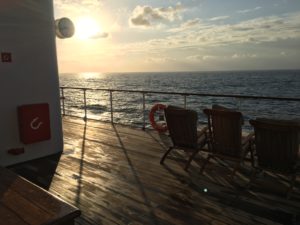
After a few more short sessions of talks by various speakers, we moved into dinner and everyone was in really great spirits and excited to depart the next day out of Southampton, for a transatlantic cruise – seven nights at sea – with no stops until we would land in Brooklyn, New York on September 7. The next morning everyone gathered onto the buses and checked in at the same port from which the Titanic left from more than 105 years ago. We were all more hopeful our voyage would reach the other side of the Atlantic. I think the only icebergs we hit were on the discussion about whether the Trump Administration has been good for conservatives, and the country, thus far.
For us, we were disembarking on the Queen Mary 2, a ship that was much larger than Titanic. In fact, while we are on a “cruise,” this isn’t even considered a cruise ship – it’s an Ocean Liner. It is made to handle rougher waters, and to plunge through the Atlantic at much faster speeds. During the journey, we really only experienced one or two days of somewhat rough seas, where we could feel the boat rocking just a little bit. One night, I felt like I was being rocked to sleep in my interior state room on the 5th deck. For some, this may cause sea sickness, but that’s never bothered me on ships. In some ways, I kind of enjoy it.
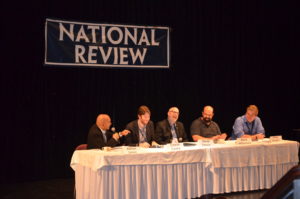
For me, I was working on this boat, so I kept very busy most of the time. With that said, the National Review cruise is like a conference on a boat. Since we had no port stops, our schedule was very simple and somewhat relaxed. Every day we had sessions from 9am to 12pm – the format was usually a 40-minute session featuring a National Review writer interviewing either another NR writer or a guest speaker. That was followed by two one-hour long panel discussion with 3-4 people on a panel, plus a moderator. The afternoons were kept relatively free for other activities or simple relaxation from the middle of the Atlantic Ocean. At one point, the captain informed us we were no closer than 500 nautical miles from the nearest piece of land – the Portuguese Azores to our south.
Inside one of the larger rooms on the boat each morning, we covered a host of policy topics: health care, immigration, national security and terrorism, abortion and adoption, free speech and religious liberty, and the second amendment. We also discussed topics such as California, Brexit, the unreliability of the GOP on Capitol Hill, how the Obama Administration treated conservatives, the dysfunction in the Democrat Party, questions about the Trump administration (and the reactions were very diverse!), and analyses of Islamofascism in the Middle East and England, and whether Central Europe should reject the EU project.
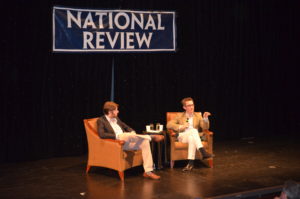
In the evenings, we were placed at different dinner tables every night. Between NRI & NR staff, writers, guest speakers, and NR supporters and subscribers, there were about 240 people part of the National Review contingent on the luxurious Queen Mary 2. The different dinner groupings allowed everyone an opportunity to mix it up with different people every night and to sit with an NR writer or guest speaker at least every other night. During the course of the cruise, my table included National Review Institute (NRI) Fellow David French, and NR writers Mark Helprin and James Lileks.
Some cruisers received extra special attention and were invited to a private lunch at one point during the week. I was at the table with some of them on a day we were joined by NRO editor Charlie Cooke and Chairman of National Review, Inc., John Hillen. For those part of NRI’s 1955 Society, we also invited them to a private reception with all of the NRI Fellows and some of the other guest speakers.
In addition to the gentlemen mentioned above, our guests had the privilege to hear from and meet NRI Fellows Kathryn-Jean Lopez, Jay Nordlinger, John O’Sullivan, Ramesh Ponnuru, Reihan Salam, and Kevin Williamson, along with other NR writers such as Jim Geraghty, Douglas Murray, and David Pryce-Jones. Other guest speakers included Senator Tom Coburn, Cleta Mitchell, Judge Michael Mukasey, Brent Bozell, Charles Kesler, and Sally Pipes.
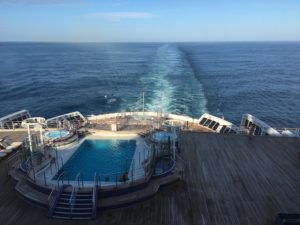
None of the presentations were recorded. These were sort of “you had to be here” moments. The discussions and panels were absolutely superb. Many of the attendees told me they felt like all the important topics of the day were covered – and that National Review seems to have assembled the brightest, most articulate writers and speakers in the conservative movement today. It’s gratifying to work for a very principled, conservative organization with highly intelligent and down-to-earth people.
While I have gotten to know some of the NR writers over the past few years, and many more over these first seven months of my time with National Review Institute, this cruise also afforded me the opportunity to meet and hear from so many others. I have been a HUGE fan and loyal listener to the Ricochet podcast over the past three years but have never met any of the hosts of the show. I didn’t even know what one of the hosts, James Lileks, looked like. But at the cocktail reception on the first night, I was in a conversation with a small group of people and one voice sounded very recognizable. I looked for his name tag, but it was flipped around. Finally I asked him, “Are you James Lileks?” He said, yes I am. I introduced myself and told him that I recognized his voice from the podcast. He was a really delightful fellow, very funny, and even offered to help me in any way possible as we further the National Review mission.
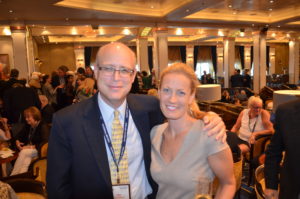
Another great new meeting was with Douglas Murray, who is around my age, but quite more brilliant! He is from the UK and the author of a new book, The Strange Death of Europe. Many people on the cruise told me they had read it and were looking forward to reading it – as it covers so many important topics including immigration and the threat of Islamofascism, among others. After hearing him interviewed by Charlie Cooke and some of his other panels on stage, I can tell you I now have this book near the top of my reading list. This topic became even more interesting to me after my recent trip to Central Europe and to London but I believe Douglas and his work will contribute much to the public discussion on so many important topics.
And, of course, I was really, really impressed with former U.S. Senator Tom Coburn, who is a medical doctor. I was able to meet him and have a short chat with him at a cocktail reception, but listening to his principled guidance on many panels throughout the week, really made an impression on me. It even caused me to whisper to one of my colleagues, “This man should have been President.” He gets it. He is conservative, but pragmatic. He talks with empathy and his solutions would help our country. I hope more conservatives continue to listen to him on a wide range of issues, but notably on health care and good governance.
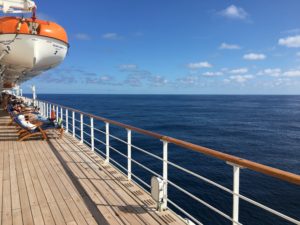
While all the speakers, including NRI Fellows and writers, were amazing to be around, I wasn’t really there to talk with them (although that was a nice benefit). I was there, along with my colleague Jason Wise and NRI President Lindsay Craig, to get to know the many “NR cruisers.” Almost all of them are subscribers to National Review magazine. Many are supporters of NRI and NR, and probably more than half had previously been on an NR cruise (I met a few who had been on more than a dozen!) These are the people who make the entire National Review enterprise possible. They not only read the print magazine and online content religiously, but they share it with their family, friends, neighbors, and colleagues; they donate to the magazine, and they donate to the National Review Institute, which promotes the legacy of William F. Buckley Jr. and extends the National Review mission to the next generation to continue to foster a strong and vibrant conservative movement.
Near the end of the NR cruise, there was a final panel that comprised John Hillen, Jack Fowler, and Lindsay Craig. They gave a report about how National Review is doing better than ever, not only financially, but also in the numbers of people we are reaching. About 8 million different people visit the NRO website each month and it gets over 40 million unique hits. People also tend to stay there a long time – some come for a specific writer; others navigate through a host of articles to stay informed. NR has a dozen or so podcasts and new ones are being created. Our writers and speakers not only appear in NR, but all over the media – from Fox News to HBO.
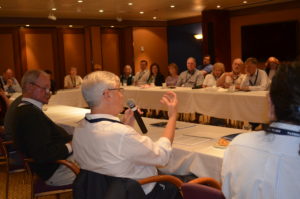
The National Review family is an interesting one. It’s always been a collection of a wide variety of voices across the spectrum on “the Right.” Today, there are voices on all sides of the conservative-libertarian spectrum, especially as it relates to the Trump administration and President Trump himself.
While we all don’t always agree on how to best advance the conservative cause, we do agree on the first principles. This was no more evident than during three special “regional fellows at sea” sessions NRI held on the boat – on three different mornings at 7:30am! Previous reading was distributed to prepare for the discussion. About 50 people showed up during each of these sessions. This was an opportunity for them to participate in a “sample” of the NRI regional fellows program for midcareer professionals that we conduct in four cities across the country. John O’Sullivan, Charles Kessler, and Reihan Salam each led one of the three sessions during the course of the week – focused on the conservatism of NR and Bill Buckley, the Founders and the Federalist Papers, and the fusion of conservative-libertarian ideas and how they have or haven’t quite worked together over the past 70 years of the movement Bill Buckley built.
During the closing of the last official panel of the last day of the cruise, Jack Fowler reminded all of us that the world is a better place because of National Review – and it would be a worse place without it. That couldn’t be more true. But I’ll add that each of our individual lives was enhanced during this past week because of the National Review cruise. We heard from great intellects on stage and in the dining halls, and we were able to converse with a wide spectrum of fellow attendees representing all parts of the United States, as well as Canada, the UK, and Israel. It is always fun getting to meet people from all walks of life and to also hear their stories.
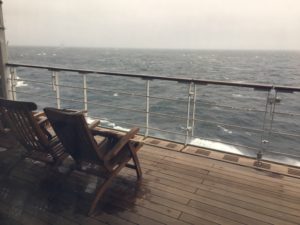
There were two types of people stuck that out on me on this cruise. First, so many people onboard told me they had not always been conservative (even a few told me they were leftist activists at some point in their life – wow!) One person said he was an open-minded member of the “New Left” and read National Review to understand the other side. But the more he kept reading the articles, the more he was converted. The other element I realized by the end of the week were how many of the men on this cruise had once served in the military. I feel like it was almost every one of them. Through their stories, they conveyed a sense of honor, sacrifice, duty, and love of country. For them, National Review was another way to support the first principles they fought for and reasons they served their country.
On the final morning, on our arrival into New York, the Queen Mary 2 slowly pulled into New York harbor. We were told the night before if we wanted to get a glimpse of the Statue of Liberty we would need to be on deck by 5am. I didn’t want to be up that early after a week at sea, but I thought about the millions of people who took much rougher passage across the Atlantic toward a land of freedom and opportunity. Some came centuries before the Statue of Liberty was conceived, on much smaller boats. Others came into New York harbor, in huddled masses and were welcomed by the iconic Statue of Liberty. And on this ship, hundreds of people woke well ahead of 5am to experience seeing the Statue of Liberty come into our vision after traveling thousands of nautical miles across the Atlantic Ocean.
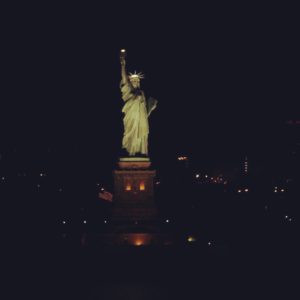
It was completely dark at 5am, but as we got closer, we could see that small little Statue of Liberty. It was lit up by lights shining on it. I got chills as I thought about what it must have been like for all the immigrants coming into this harbor over the last 150 years since Lady Liberty was first erected there and, to see a light shining in the darkness. I then thought about the places I traveled to on my personal time ahead of this cruise: I had visited a Holocaust concentration camp in Germany, Hitler’s Eagle’s Nest, the Nazi-dominated country of Austria, the Soviet-dominated countries of Hungary and the former Czechoslavakia, where we saw the site of the Velvet Revolution in Prague, and then there was my visit to Churchill’s war rooms in London before setting sail further west to America.
I then thought about all the discussions we had over the past week on the National Review cruise about protecting liberty for ourselves and for future generations. And here we were, being welcomed back to America, through the darkness, by Lady Liberty herself. I count myself lucky to have had the opportunity to go on a National Review cruise, and especially lucky that I can work for such a prestigious organization doing the work that will continue to promote and protect the principles of Western Civilization and guide home all those yearning to breathe free.
